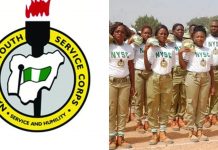Government Examination Questions for SS1 Students|First Term
ALSO CHECK OUT THE FOLLOWING EXAM QUESTIONS=>
- English Studies Examination Questions for JSS2
- English Studies Examination Questions for JSS2
- Examination Questions for Senior Secondary School SS2|
- Civic Education Examination Questions for Junior Secondary School JSS1
Government Examination Questions for SS1 Students|First Term —2018/2019 FIRST TERM EXAMINATION
Subject: Government Class: SS 2 Time: 2 Hours
Instruction: Answer ALL Questions in Section A and any FOUR Questions from both Section B and Section C
1. Which of the following is not merit of checks and balances? …………….. (a) prevents excessive use of power (b) has respect for human right (c) encourages the use of veto power (d) prevent dictatorship
2. The following are merits of separation of power except ………………. (a) abuse of power (b) freedom and liberty (c) stable political system (d) absence of dominance
3. Political power could be acquired through ……….. (a) persuasion (b) election (c) sanction (d) nomination
4. Government protects the lives and property of the citizens of a state through the …………… (a) court and the police (b) legislature and prisons (c) ministries and police (d) customs and the police
5. The recurrent coups in West African countries resulted in …………. (a) dictatorship (b) political instability (c) nepotism (d) security
6. Auditing the accounts of public corporations amounts to ………… (a) media control (b) limited control (c) financial control (d) mass control
7. The laws of the pre-colonial African political systems were ………… (a) written (b) codified (c) unwritten (d) rigid
8. The money given by the government to local authorities is known as …………… (a) block grants (b) capital expenditure (c) loans (d) royalties
9. Collection of rates from shops is a source of revenue to ………….. (a) civil service (b) public corporation (c) local government (d) federal government
10. An advantage of public corporations in Nigeria is …………… (a) exposure (b) autocracy (c) creation of unemployment (d) provision of essential services.
11. Neutrality in the civil service means that …………. (a) civil servants should be partisan (b) public control (c) civil servants should be loyal to the government and non-patrisan (d) be politically relevant
12. Which of the following is not a problem of electoral commission in Nigerian ……………. (a) electoral malpractices (b) inadequate personnel (c) inadequate funds (d) registration of voters
13. The body responsible for conducting and supervising elections in Nigeria? …………….. (a) ombudsman (b) electoral commission (c) election commission (d) constitution assembly
14. Which of the following is not an aim of pressure group? …………… (a) conducting election (b) influencing government decisions (c) education members (d) agitating for interest
15. Which of the following is not a factor that promotes democratic electoral system? …………. (a) political consciousness (b) periodic election (c) independent of the judiciary (d) popularity of the governors
16. The purpose of an election is to ………….. (a) allow people to participation in choosing their leader (b) dethrone corruption (c) give political power to the rich (d) count votes in the public
17. Universal Adult suffrage is popular because it …………. (a) it promotes limitation (b) allows for greater political participation (c) it encourages two party system (d) ensure state performance of Government
18. Which of the following is an example of a general election ………..…… (a) local government (b) state-election (c) presidential election (d) student union election
19. In limited franchise, restriction on voting can be based on …………. (a) poverty (b) property (c) strength (d) exposure
20. Party manifesto is important in the following ways except to …………… (a) evaluate the party (b) limit choice (c) attract people (d) guide the party
21. Which of the following is not a function of the judiciary? ………….. (a) settlement of dispute (b) interpretation of law (c) protection of rights (d) maintenance of law and order
22. Which of the following is not within the scope of a constitution ………….. (a) fundamental human rights (b) organs of government (c) coup d’ etat (d) punishment for law-breakers
23. Monarchy means government …………. (a) headed by a king (b) by the people (c) of the majority (d) the masses
24. Totalitarianism means government ………… (a) a dictator (b) wealthy people (c) educated elite (d) the masses
25. Delegated legislation is necessary because it ………… (a) helps to promote dictatorship (b) prevents development (c) is useful in times of emergency (d) gives a lot of power to the president
26. Fundamental human rights seek to …………… (a) promote the dignity of man (b) train political enemies (c) encourage terrorism (d) enthrone mob rule
27. The rule of law is observed when …………….. (a) democracy is practiced (b) laws are kept secret (c) corruption is encourage (d) only the elite can govern the society
28. The system of government in which the president acts as the head of state and the head of government is (a) monarch (b) presidential (c) unitary (d) parliamentary
29. Which of the following function is performed by the Executive …………….. (a) recruitment of thugs (b) implementation of policies (c) passing of Bills to laws (d) judging of cases
30. Which of the following is true of a parliamentary system of government? …………. (a) the prime minister is the head of the judiciary (b) collective responsibility is emphasized (c) fusion of powers is discouraged (d) there is no prime minister
31. Which of the following is not a source of a country’s constitution? ……………… (a) legislation (b) past constitutions (c) judicial precedents (d) presidential speech
32. Public opinion enables a government to …………. (a) to Act crazy (b) suppress its opponents (c) cut down power (d) know the feeling of the people
33. Public corporations are set up by …………… (a) public opinion (b) private sectors (c) act of parliament (d) director
34. One of these is not a nationalists? ……………… (a) Goodluck Jonathan (b) Anthony Enahoro (c) Ahamdu Bello (d) Obafemi Awolowo
35. Which of the following statement distinguished political parties from pressure groups (a) political parties only lobby government to change pertain policies (b) pressure groups elect politicians (c) political parties impeaches the president (d) pressure groups influence government policies to member’s interest
36. Franchise means the right of all qualified citizens to ………….. (a) manipulate elections (b) vote and be voted for (c) cause riot (d) rig election
37. Which of the following was not a reason for the adoption of indirect Rule in Nigeria …………… (a) the elites approved of it (b) language Barrier (c) the traditional rulers commended respect among their subjects (d) there was insufficient funding
38. A British colony means ………….. (a) a territory endowed with farm land (b) an area of colonial plantain (c) a settlement (d) a territory acquired by the British colonialists through settlement or conquest
39. The strong emotional awareness of belonging to a nation state held in bondage by foreign domination is called …………. (a) nationalism (b) centralisation (c) exponents (d) foreign domination
40. Which of the following is a feature of a state? …………. (a) corruption (b) territory boundary (c) temporary existence (d) pursuance of sectional interest
THEORY SECTION—SECTION B
Instruction: Answerer any two questions in this section
1a. State four differences between civil service and public corporation (8 marks)
b. Define the concept of the public corporation (2 marks)
2a. What is civil service? (2 marks)
b. Mention four functions and powers of the civil service commission (4 marks)
c. List and explain three functions of the civil service (4 marks)
3a. What is public poll or opinion? (2 marks)
b. Highlight four ways public opinion can be formed (8 marks)
4a. What is political party? (2 marks)
b. Outline four ways political parties compete for power
SECTION C
Instruction: Answer any two question in this section
5. Using five points, differentiate between pressure groups and political parties
6a. Define local government administration (2 marks)
b. Mention six functions of the local government (8 marks)
7a. What is franchise? (2 marks)
b. List and explain types of franchise that you know (8 marks)
8a. Define pressure groups (2 marks)
b. Highlight four types of pressure groups (8 marks)
RECOMMENDED LINKS:
- English Studies Examination Questions for JSS2
- English Studies Examination Questions for JSS2
- Examination Questions for Senior Secondary School SS2|
- Civic Education Examination Questions for Junior Secondary School JSS1




